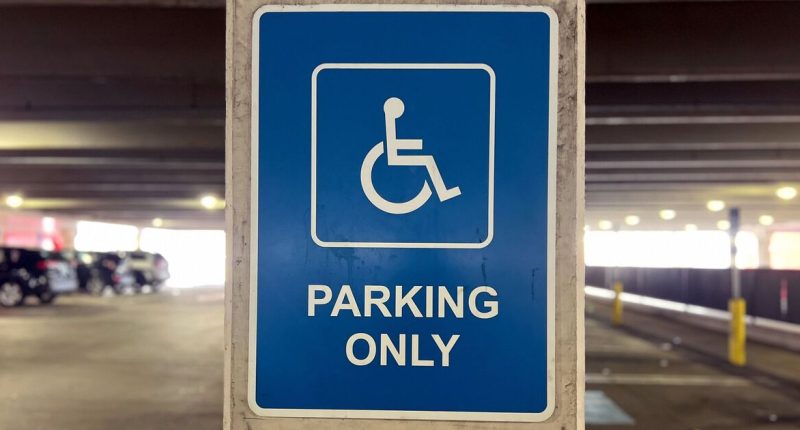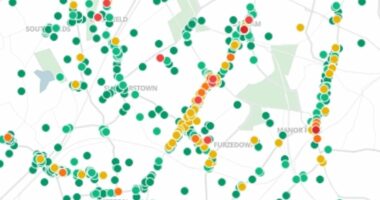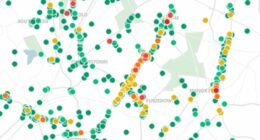Share this @internewscast.com
Venturing out can be a lifeline for many, but it can prove challenging if your mobility is compromised. However, if you’re disabled or have a health condition that affects your mobility, you can apply for a Blue Badge.
These Blue Badges grant you enhanced parking privileges – such as the ability to park on double yellow lines or in disabled parking bays. This can significantly ease social activities as well as vital tasks like hospital appointments. Certain groups of people are automatically eligible for one of these badges however you still need to apply for yourself or if you care for a child who’s disabled or has a health condition that affects their mobility.
While local councils can charge for a blue badge, the maximum fee is £10. More information about the Blue Badge scheme can be found through GOV.UK from your local council, but Citizens Advice has detailed everything you need to know on its website.
The charity states that if you receive certain benefits, you will automatically qualify for a Blue Badge. The application process will be straightforward, reports Chronicle Live.
And you don’t need to be able to drive to apply for a Blue Badge, unless you’re applying due to issues with your arms. However, there’s an important warning – you can’t use an expired badge, so you must ensure you apply for a new one as early as possible.
Who can get a Blue Badge
Citizens Advice explains you automatically get a Blue Badge if if you:
-
are registered as blind
-
care for a child who is blind and aged over 2
-
get the higher rate of the mobility component of Disability Living Allowance (DLA) – check your decision letter if you’re not sure
-
get War Pensioners’ Mobility Supplement
-
received a lump sum payment as part of the Armed Forces Compensation scheme (tariffs 1 to 8), and have been certified as having a permanent and substantial disability
If you get Personal Independence Payments (PIP)
Citizens Advice says you automatically qualify for a Blue Badge if you either:
-
scored 8 points or more in the ‘moving around’ area of your PIP assessment
-
scored 10 points in the ‘planning and following journeys’ area of your PIP assessment and were put in category ‘E’ – this means your stress, anxiety or other mental health issue stops you leaving the house
You should check your PIP decision letter if you’re not sure.
Those who might be able to get a blue badge
You can still get a badge if:
-
you have long-term problems walking or going to places – including problems caused by stress, anxiety or other mental health issues
-
you have severe problems using both your arms
If you’re applying on behalf of a child, you can still get a badge if the child is:
How to apply for a Blue Badge
You can apply for or renew your Blue Badge online on GOV.UK, says Citizens Advice. Some councils also let you apply on a paper form – contact your local council to check.
You have to apply through your local council – your doctor can’t help you get a Blue Badge. Your local council might also arrange an appointment to visit you – they’ll let you know if you need this.
If you’re not automatically eligible, you’ll need to fill in an extra part of the application form to explain why you need a badge. The application is more complicated if you’re not automatically eligible – you can contact your nearest Citizens Advice for help.
Documents you need
Before you apply you will need to have some documents. Make sure you have:
-
your National Insurance number or child reference number if you’re applying for a child
-
the number, expiry date and local council on your current blue badge, if you have one
You will also need:
-
your original decision letter from the Department for Work and Pensions – if you’re automatically eligible for a badge
-
details of your medical condition – if you’re not automatically eligible for a badge
-
proof of identification – for example, a birth or marriage certificate, passport or driving licence
-
proof of your address from the last 12 months – for example, a council tax bill, driving licence or letter from a government department
-
a recent digital photograph of the person the badge is for – this can be from your own device or from a photo booth or shop
Tips for postal applications
Citizens Advice says: “Send copies of your documents rather than originals, in case your application gets lost in the post. You need to get the copy of your proof of identification checked by a professional person, like a solicitor – this is called certifying a document.
“Some professional people might charge to certify a document. They should sign the copy and write on it:
-
the words ‘This copy is a true likeness of the original’
-
their name, address and occupation
-
the date
Find out more about how to certify a document on GOV.UK.
What happens after you’ve applied
“It could take a long time for your application to be processed, ” warns Citizens Advice. “You should contact your council if you haven’t heard back within 12 weeks.”
You might be asked to do a mobility assessment. A health professional will look at your ability to carry out a range of mobility activities. They’ll tell your council whether they think your health condition or disability limits your ability to move around enough for you to need a badge.
You also might be asked to send in extra information or speak to a member of the council. Your council will tell you in writing if this is the case.
If you’re refused a Blue Badge, you can ask your council to reconsider their decision. The decision letter from the council will tell you how to ask for a review and what the time limit is.
Renewing your Blue Badge
You’ll need to renew your badge after three years. You’ll also have to re-apply for a badge if you stop getting the benefit your badge is linked to.
You can renew your Blue Badge online on GOV.UK. Some councils also let you renew your Blue Badge using a paper form – contact your local council to check.
You must give your Blue Badge back to your council if you no longer need it, for example if your condition improves. You could be fined up to £1,000 if you don’t.
















